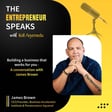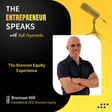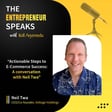
Navigating Growth and Leadership : Insights from Robert Levin
In this episode of The Entrepreneur Speaks Podcast, host Kofi Anyemedu sits down with Robert Levin, seasoned entrepreneur, investor, and founder of CIS Ventures. With a diverse background that spans serving as a Navy veteran, studying at Harvard Business School, and leading multiple successful ventures, Robert brings a wealth of experience in entrepreneurship, leadership, and investments.
Together, we explore his entrepreneurial journey, the highs and lows of building businesses, and his expertise in mergers, acquisitions, and corporate buyouts. Robert breaks down what makes a company truly investable, the common mistakes entrepreneurs make when preparing for acquisition, and the leadership principles that have guided his success.
Whether you’re a startup founder seeking growth, an established business owner considering acquisition, or simply looking for timeless lessons in entrepreneurship and leadership, this conversation is packed with actionable insights and inspiration.
Tune in as Robert Levin shares his wisdom on scaling businesses, mentoring the next generation of entrepreneurs, and building ventures that stand the test of time.



















